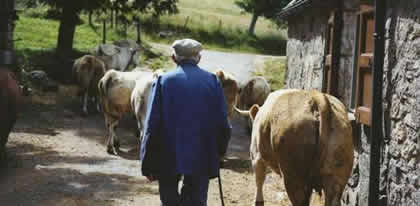“La vie moderne” is a tragicomic piece. Depardon tenderly captures hilarious moments that set the audience laughing throughout the film yet this homage is also tinged with a pang of loss. But his film is poetry, a celebration. Lone scapes. Red eyes of a tired old man staring at space, silent as the clock ticks, perfectly still, a fly on his blue shirt, on his shoulder. Frozen in time.
“You have to be passionate to do this work” says the shepherd, in his late eighties. In another shot, we see him in the tall grasses of the field, swayed by the strong wind, flock of sheep at his feet. Sky above.
For ten years, Depardon, photoreporter and documentarian, has been working on this trilogy on the rural France he grew up with and is attached to. “La vie moderne” is the third piece in the series but a complete piece on its own.
The camera takes us along deserted winding roads from one farm to the next, where we meet Marcel and his brother, both in their eighties, their nephew and his wife who is not from around there and it causes some tensions, the fact that she’s an outsider. We meet another who is watching the memorial service for l’abbé Pierre on TV, a rolled cigarette resting on his lower lip. We have breakfast at dawn with a couple in their eighties who have only two or three cows left. The woman’s eyes sparkle as she offers coffee and madeleines. We also meet the younger generations, many of them unsure about perpetuating the old ways, a poignant dilemma.
Depardon gives a tender portrait not just of people but of landscapes and of a disappearing lifestyle, another world, an era fading. Many of the younger generations abandon the old ways and move away. Farmers will be different in the future, a mother explains to her son, they’ll be useless.
This film presents a face of France not very well known, but a face familiar to most French people, or even all European people. Many of our parents or grandparents lived this lifestyle. Up until the industrial revolution took full force in France at the turn of the XIXth century, 90% of France’s population was rural. Since then however, urbanization has been increasing, with the last wave of rural migration occurring after 1945. In the forties and fifties, farm life was still a reality for many. Hearing mass on TV, the rolling accent of the Southwest, oilcloth tablecloth and wallpaper, these are familiar and endearing details.
Depardon has a discrete presence, asks few questions and gives no commentary, only a sentence at the end, a feeling rather than a commentary. There is no need for any. If you want a glimpse of the authentic French rural life, don’t read Peter Mayle (whom the French unanimously scoff at by the way), see this film. (Or read Pagnol, Giono and René Char and see Pagnol’s film adaptations by himself and Claude Berri).
“La Vie Moderne” had its Los Angeles premiere at the ColCoa festival last week. It has been nominated for a Cesar at Cannes for best documentary.
*****
Weak: 1 Star Average: 2 Stars Good: 3 Stars Very Good: 4 Stars Excellent: 5 Stars

